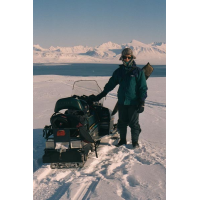Arctic Snow tested for Insecticides

Snow and air samples from the Arctic are to be tested for insecticides by Lancaster University scientists.
Dr Crispin Halsall of Lancaster University’s department of Environmental Science has received a £20,000 grant from Cambridge Environmental Assessments and Bayer CropScience, to investigate the occurrence of Endosulfan - a commonly used insecticide.
The samples of snow and air, which have been collected by the University on previous expeditions, are stored in large freezers in the Lancaster Environment Centre.
The samples will now be tested for the insecticide, which is currently used on crops across Europe and North America ranging from vegetables to orchards.
Previous research indicates that Endosulfan is carried from source regions to the Arctic through the atmosphere and is deposited on the ocean surface. Once in the water it begins to enter the food chain via lower life forms such as plankton, then is later absorbed by fish and marine mammals such as seals.
Dr Halsall said, although the toxicity of the insecticide was uncertain, there was evidence that the chemical was metabolised by higher marine animals and the residues retained in the body for a long period of time.
He said: “This research grant enables us to assess the pathways of this chemical into the Arctic, its loading into relevant environmental compartments, as well as identify research needs with respect to understanding its behaviour and fate in cold environments.”